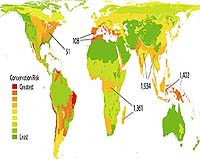| . |  |
. |
Singapore (AFP) Jan 17, 2010 Illegal wildlife traders are turning to the Internet to reach a wider customer base, circumvent laws and evade authorities, an animal rights activist told a conference on Sunday. Items such as rhinoceros horns, leopard pelts and even live tiger cubs are being hawked openly in online advertisements on public websites, said Grace Ge, Asian regional director of the International Fund for Animal Welfare (IFAW). The Internet offers anonymity for the seller as well as fast and untraceable sales, while inadequate legislation governing online companies ensures relative impunity, she said at a regional animal rights conference held in Singapore. "The Internet has facilitated the trading of wildlife, which is having a devastating effect on animals and ecosystems worldwide," she said. Through the Internet, traders are able to "circumvent rules, regulations and evade enforcement", Ge told delegates at the Asia for Animals 2010 conference. Citing an IFAW study on the illegal online wildlife trade in 2008, Ge said there was a "huge volume of wildlife and their products traded online on a daily basis". The research was conducted over a three-month period in 2008 in 11 countries including the United States, China, Australia and several European nations. It found 7,122 online advertisements selling endangered species or products derived from their slaughter. The United States was a major culprit as the source of 70.5 percent of advertisements, followed by Britain and China with 7.7 percent and 7.6 percent respectively, the study showed. Estimates of the value of final sales on these websites totalled more than 457,000 dollars, but the actual amount was likely to be higher as most sites did not advertise their prices, according to the study. Meanwhile, animal rights activists said at the conference that cooperation rather than conflict with traditional Chinese medicine (TCM) practitioners was more effective in protecting wildlife from poachers. Executive director of the Animal Concerns Research and Education Society (ACRES) Louis Ng said the previous approach of confrontation had not been as effective. "We realised we had to work with them (the TCM industry)," he told the delegates. He cited a joint initiative between ACRES and Singapore TCM practitioners in which they created a labelling scheme to discourage local TCM shops from selling products made from endangered animal species. To date, more than 20 percent of all TCM shops in Singapore were adhering to the voluntary initiative, Ng said. Executive director of animal welfare group Animals Asia Foundation Jill Robinson said TCM practitioners were more than willing to cooperate with activists. "I think they are recognising that the use of animals is causing such a slight and such a bad reputation... they actually don't want to see this happening any more," she said. TCM shops sell medicinal products made from animals such as bears and tigers.
Share This Article With Planet Earth
Related Links Darwin Today At TerraDaily.com
 Ban Ki-moon announces Year of Biodiversity
Ban Ki-moon announces Year of BiodiversityUnited Nations, N.Y. (UPI) Jan 11, 2009 A failure to protect the world's natural resources is a wake-up call for people everywhere, U.N. Secretary-General Ban Ki-moon said Monday. The secretary-general called for a global alliance in announcing 2010 as the International Year of Biodiversity. "We must counter the perception that people are disconnected from our natural environment. Biodiversity is life. Biodiversity is ... read more |
|
| The content herein, unless otherwise known to be public domain, are Copyright 1995-2009 - SpaceDaily. AFP and UPI Wire Stories are copyright Agence France-Presse and United Press International. ESA Portal Reports are copyright European Space Agency. All NASA sourced material is public domain. Additional copyrights may apply in whole or part to other bona fide parties. Advertising does not imply endorsement,agreement or approval of any opinions, statements or information provided by SpaceDaily on any Web page published or hosted by SpaceDaily. Privacy Statement |